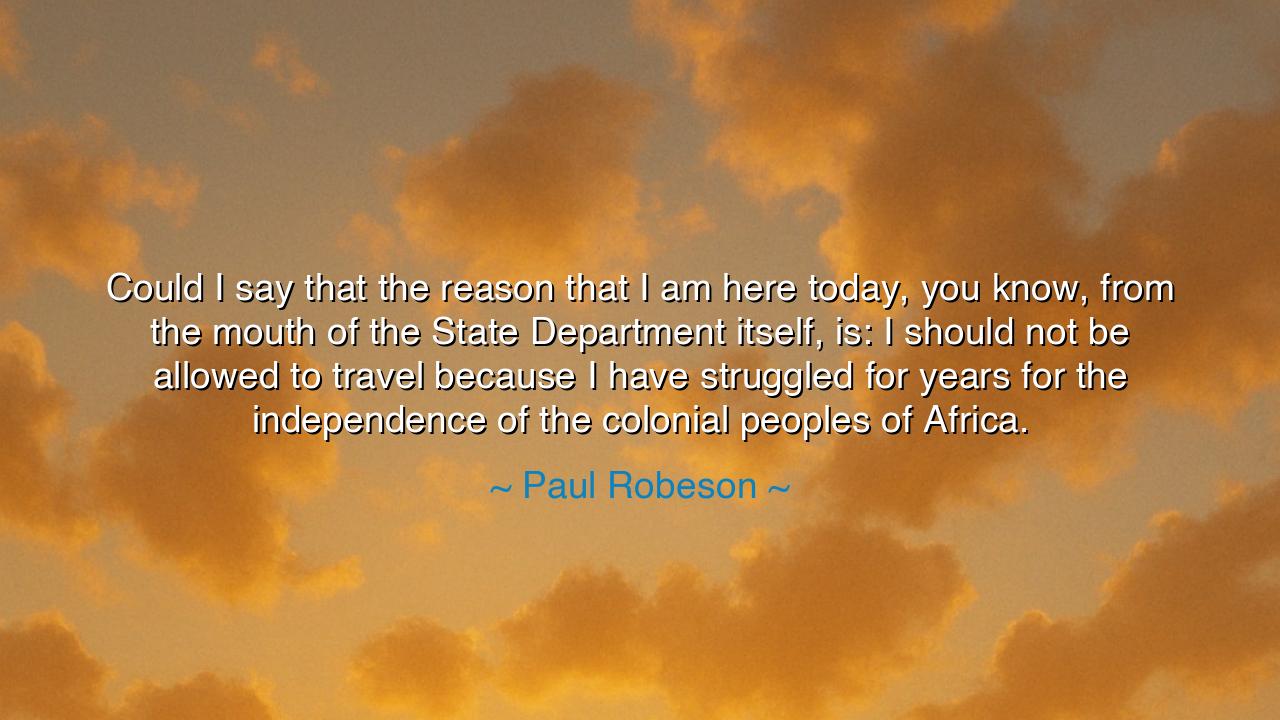
Could I say that the reason that I am here today, you know, from
Could I say that the reason that I am here today, you know, from the mouth of the State Department itself, is: I should not be allowed to travel because I have struggled for years for the independence of the colonial peoples of Africa.






Listen, O children of the future, to the words of Paul Robeson, a man whose courage and commitment to justice transcended the boundaries of his time. "Could I say that the reason that I am here today, you know, from the mouth of the State Department itself, is: I should not be allowed to travel because I have struggled for years for the independence of the colonial peoples of Africa." In these words, Robeson reveals the stark truth of a battle that was fought not only in the political arena, but in the hearts of all who dared to seek freedom from oppression. These words, though spoken in a particular moment, echo through the ages, reminding us of the eternal struggle between oppression and the desire for freedom.
The ancient world, too, was marked by such struggles—struggles for independence against the shackles of tyranny. Greece, that land of philosophers and warriors, faced the domination of Persia for centuries, until the spirit of the Greek people rose up in defiance. It was the Greek city-states—small in number yet powerful in spirit—that united against their oppressors, battling not just for their lands, but for their freedom to live according to their own will. This resistance was not only a battle for territory, but a battle for the very soul of the people, for the right to shape their own future.
In Robeson’s time, the struggle for the independence of African peoples was not unlike that of the Greek city-states. Africa, a continent long ravaged by colonial powers, was home to peoples whose dignity and sovereignty had been stolen by foreign rulers. The European powers—Britain, France, Belgium, and others—had drawn borders across the map of Africa, carving out colonies for their own benefit. Yet, in the face of this domination, there rose leaders, thinkers, and revolutionaries like Paul Robeson, who refused to accept the status quo. Robeson, through his advocacy for African independence, embodied the spirit of those who longed to break free from the chains of colonialism, who dreamed of a world where the peoples of Africa could govern themselves and live with dignity.
Robeson’s struggle was not a silent one. He used his voice, his music, and his platform to speak out against the oppression of the African people. Yet, in doing so, he was met with resistance—by those who sought to silence the voices of the oppressed. The State Department’s attempt to restrict his freedom to travel was a reflection of the lengths to which those in power would go to suppress the call for freedom. In Robeson’s case, his advocacy for African independence became the very reason he was targeted—an inconvenient truth for those who sought to maintain control over the colonial peoples of Africa. His story is not one of simple victimhood, but of a heroic struggle against those who would silence the truth.
But in the resilience of Robeson’s spirit, we see the timeless truth that freedom cannot be taken by force alone; it must be earned through the strength of resistance and the unwavering commitment to the cause of justice. Robeson, by continuing to speak for the independence of Africa, embodied the sacred duty of those who stand against tyranny. His willingness to face personal sacrifice—including being denied travel and vilified by the very government he served—was a reflection of the deep conviction that the cause of freedom is not one to be abandoned in the face of adversity.
The lesson that emerges from Robeson’s words is one of profound importance: independence is not simply the absence of external control; it is the strength of spirit, the courage to stand up against those who would suppress the rights of others. It is a reminder that freedom is never freely given; it must be earned, through struggle, through sacrifice, and through a willingness to stand in the face of those who seek to oppress. Robeson’s struggle for the independence of colonial peoples was not just a battle for Africa; it was a battle for the very soul of humanity, a battle that asks us all to consider the cost of silence in the face of injustice.
So, O children of the future, take this wisdom to heart: never be afraid to stand for what is right, even when the forces of power seek to silence you. The struggle for independence—whether of a nation, a people, or an individual—is long and fraught with challenges. But remember the example of Paul Robeson and the heroes who came before him, who fought not for personal gain but for the freedom and dignity of others. Let your voice be a beacon for justice, and let your actions reflect the unshakable belief that freedom is a right for all. In this, you will honor the struggles of those who came before, and you will build a future where the call for independence can never again be silenced.






AAdministratorAdministrator
Welcome, honored guests. Please leave a comment, we will respond soon